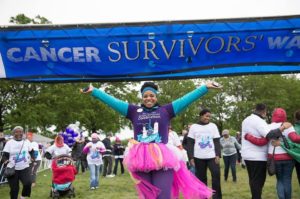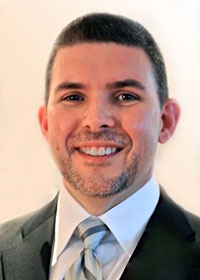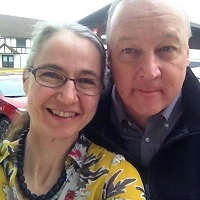May 31, 2016:
As Big Ten Cancer Research Consortium members work every day to defeat cancer, they are constantly aware that behind every office appointment, pathology report, and scan is the story of a survivor. In honor of National Cancer Survivors Day on June 5, we celebrate examples of our members working to improve the lives of all patients with cancer.
The Robert H. Lurie Comprehensive Cancer Center of Northwestern University will host the 23rd Annual Cancer Survivors’ Celebration Walk & 5K on Sunday, June 5 in Chicago’s Grant Park.

Held annually on National Cancer Survivors Day (the first Saturday in June), this community event is expected to bring more than 4,000 cancer survivors, families, and friends together with the physicians, scientists, and health professionals who support them.
Find out more about the event, register, or make a donation!
Chicago Researchers Roll Out Best Practices for Supportive Care of Cancer
The Lurie Cancer Center of Northwestern University and Northwestern Medicine are working with key community stakeholders to guide the implementation of best practices for distress screening and survivorship care among cancer patients across the Chicago community as part of the Coleman Supportive Oncology Initiative funded by the Coleman Foundation. Distress screening involves administering surveys by care providers to identify physical and emotional burdens cancer patients may be experiencing, and provide access to care and resources to address their needs. The survivorship care component involves addressing the needs of patients once they have completed primary treatment and providing them with a survivorship care plan that includes key information about their treatment, follow-up, as well as healthy lifestyle recommendations.

Frank Penedo
“Having a screening and referral process in place for the emotional and physical needs of cancer patients is critical to providing optimal care and maximizing quality of life during an often challenging period,” said Frank J. Penedo, PhD, principal investigator of the CSOI’s distress screening and survivorship initiative teams and director of the Lurie Cancer Center’s Cancer Survivorship Institute. “Having a system in place that provides patients with the opportunity to report their physical, emotional and practical concerns allows their care team to address their needs and refer them to a provider that can help. Concerns like depression, anxiety, or even lack of knowledge, transportation or childcare can get in the way of treatment and follow-up. By identifying these problem areas, we can help patients tap into the best available resources, address these needs and optimize their care”.
Read more.
The Cancer Survivorship Institute (CSI) at the Robert H. Lurie Comprehensive Cancer Center of Northwestern University is an interdisciplinary institute that brings clinicians and scientist together to stimulate and support exception cancer survivorship patient care and research programs. Frank Penedo, PhD, is the CSI’s Director. CSI’s programs include: AYA Oncology Program, Adult Cancer Survivorship Clinics, STAR Program for adult survivors of pediatric cancer, and the Lynn Sage Breast Cancer Survivorship Program.
Survivorship Conference
Rachel Isaksson Vogel, Ph.D., Assistant Professor in the Department of Obstetrics, Gynecology and Women’s Health, and member of the Masonic Cancer Center’s Screening, Prevention, Etiology and Cancer Outcomes Program, will present her melanoma survivor research at a June Cancer Survirorship Conference in Washington, DC. A total of 726 long-term early stage melanoma survivors and 657 controls completed a survey of quality of life (QOL) and sun protection and behavior measures. Long-term early stage melanoma survivors reported similar general QOL and mental health compared to population controls. Further, melanoma survivors reported healthier UVR exposure and protection behaviors compared to controls. Dr. Vogel notes that” opportunities remain to reduce future melanoma risk among melanoma survivors, as a significant proportion reported elevated sun exposure, sunburns and suboptimal UVR protection behaviors. “
The University of Minnesota Masonic Cancer Center sponsored the 11th Annual Cancer Survivorship Conference on April 30, 2016, attended by 350 participants. Cancer survivors, their families and caregivers held discussion on issues that often face cancer survivors often face after cancer treatment or following stem cell transplantation.
Healthier, Longer, Stronger
![Hematologist/oncologist Anne Blaes, M.D., views cancer treatment as eliminating the disease while keeping the person’s long-term health top of mind. [Photo by Scott Streble]](https://bigtencrc.org/wp-content/uploads/2016/05/mccn-f15-healthier-02blaes_0-300x175.jpg)
Hematologist/oncologist Anne Blaes, M.D., views cancer treatment as eliminating the disease while keeping the person’s long-term health top of mind. [Photo by Scott Streble]
Twelve Year Cancer Survivor, Patricia Zody
A cancer diagnosis understandably may lead to anxiety and fear, and Patricia (Pat)

Patricia Zody and her husband, Rob LaFleur
Zody’s diagnosis was no different. Although her brain was physically affected, she has made it nearly 12 years as a cancer survivor by making sure her illness never got the best of her mind.
Even after 12 years, she has to receive regular follow-up care to determine if the cancer has recurred, though those MRI scans happen less and less frequently the longer she remains cancer-free.
“The basic ideas that my husband and I took away from our conversations at the Cancer Center included: ‘You can spend all of your time worrying about scan results, but in doing so you have wasted that time whether or not the results are negative or positive,” Zody said. “We really took this advice to heart.”
Lori Hayes, MS, RN, knows Zody has lived up to this mantra. Hayes is one of Zody’s nurses at the UW Carbone Cancer Center, and has been ever since Zody began treatment. “Pat makes an impression,” Hayes said. “I think of all the challenges she’s been through with surgery and radiation, but she’s working, she’s overseas, and it’s like, here’s someone who has figured out how to live with her diagnosis and side effects of the tumor and treatment while still creating a forward-rich life.” Read full story.
Honor a Survivor by Joining the Fight Against Cancer
![]() Did you know you can directly support the team efforts of the Big Ten Cancer Research Consortium? Make a gift today!
Did you know you can directly support the team efforts of the Big Ten Cancer Research Consortium? Make a gift today!
This story was compiled by Alecia Burkhardt, communications associate for the Big Ten Cancer Research Consortium, with contributions from the Robert H. Lurie Comprehensive Cancer Center, University of Minnesota Masonic Cancer Center, and the University of Wisconsin Carbone Cancer Center.
About the Big Ten Cancer Research Consortium: The Big Ten Cancer Research Consortium was created in 2013 to transform the conduct of cancer research through collaborative, hypothesis-driven, highly translational oncology trials that leverage the scientific and clinical expertise of Big Ten universities. The goal of the Big Ten Cancer Research Consortium is to create a unique team-research culture to drive science rapidly from ideas to new approaches to cancer treatment. Within this innovative environment, today’s research leaders collaborate with and mentor the research leaders of tomorrow with the unified goal of improving the lives of all patients with cancer.
About the Big Ten Conference: The Big Ten Conference is an association of world-class universities whose member institutions share a common mission of research, graduate, professional and undergraduate teaching and public service. Founded in 1896, the Big Ten has sustained a comprehensive set of shared practices and policies that enforce the priority of academics in the lives of students competing in intercollegiate athletics and emphasize the values of integrity, fairness and competitiveness. The broad-based programs of the 14 Big Ten institutions will provide over $200 million in direct financial support to almost 9,500 students for more than 11,000 participation opportunities on 350 teams in 42 different sports. The Big Ten sponsors 28 official conference sports, 14 for men and 14 for women, including the addition of men’s ice hockey and men’s and women’s lacrosse since 2013. For more information, visit www.bigten.org.
















Subscribe to the Big Ten CRC Newsletter X
X Facebook
Facebook YouTube
YouTube